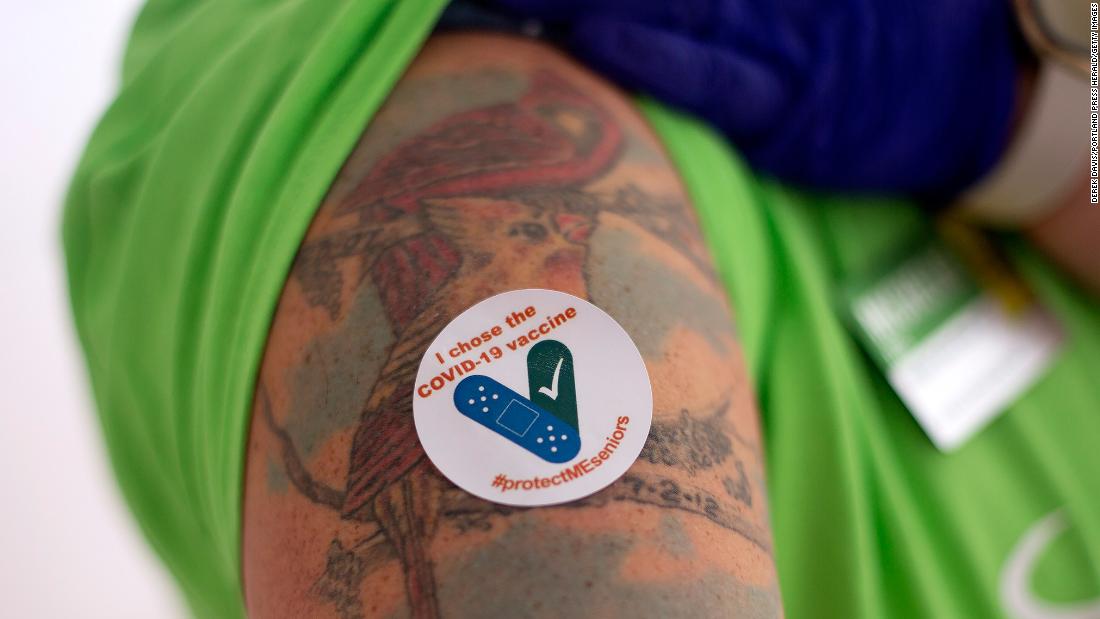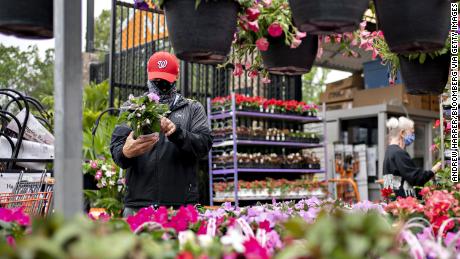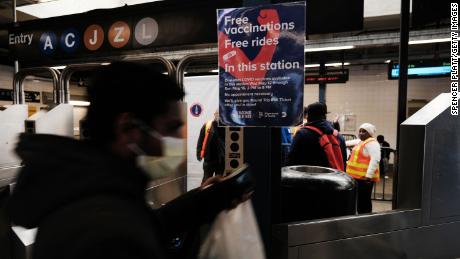Wait, does this mean the pandemic is over for vaccinated people?
“If you are fully vaccinated, you can start doing the things that you had stopped doing because of the pandemic,” CDC Director Dr. Rochelle Walensky said in a White House briefing. “We have all longed for this moment when we can get back to some sense of normalcy.”
Walensky said the science in three areas led to the change.
“One is the effectiveness of the vaccines in general and in a real-world population. One is the effectiveness against variants, which was just published last week, and then the effectiveness in preventing transmissibility,” Walensky said.
That’s in addition to a drop in new Covid-19 cases and the widespread availability of vaccines and access to them.
As of Thursday, almost 36% of Americans were fully vaccinated, with almost 46% of adults fully vaccinated.
The guideline change raised a lot of questions, however. Here’s a look at some of them.
Does this mean we can go back to normal?
Though he wouldn’t go so far as to say the pandemic is over, for those who are fully vaccinated, the guideline change means a return to something very close to normalcy, Dr. Anthony Fauci, director of the National Institute of Allergy and Infectious Diseases, told CNN after the announcement.
“Being able to go around without a mask, indoors as well as outdoors, is really a big step in that direction,” Fauci said. “I wouldn’t want to declare victory prematurely, but I’m saying this is clearly a step in the direction that we want to go.”
“If you are fully vaccinated, you can resume activities that you did prior to the pandemic,” the CDC says in its guidelines.
“It is an amazing step forward,” Dr. Francis Collins, head of the National Institutes of Health, told CNN’s Erin Burnett. “It says we are on the right path.”
Does this mean I can throw away my masks?
Masks will still be needed for a while, as local, institutional and governmental regulations take precedence over the CDC’s guidance.
As the CDC says on its website: “Fully vaccinated people can resume activities without wearing a mask or physically distancing, except where required by federal, state, local, tribal, or territorial laws, rules, and regulations, including local business and workplace guidance.”
Masks will still be required for travel, since the Biden administration’s transportation mask mandate will stay in place through September 13, US Transportation Security Administration spokesperson Lisa Farbstein told CNN on Thursday.
Institutions and businesses also could still keep mask requirements in place, as could the states and cities that still have them.
“There are going to be institutions, clearly, that are going to be saying — and that could be airlines, we know certain colleges are also saying — if you’re not vaccinated, you’re not going to come on campus to classes in real time, and there are going to be some institutions that might be saying the same thing,” Fauci told CNN’s Jake Tapper.
Fully vaccinated residents of long-term care facilities and their visitors may visit in a private room without masks, according to Cristina Crawford, senior manager of public affairs for the American Health Care Association.
Unvaccinated people, including children, also still need to wear a mask to protect themselves and others from getting the coronavirus, of course.
Will the relaxed guidance lead to more people getting shots?
Giving vaccinated people the freedom to go maskless and get close to others again is exactly the sort of reward pundits have been calling for as real incentives to get vaccinated.
“The incentive for getting vaccinated should be that you can go into your workplace, that you can go into movie theaters and restaurants,” George Loewenstein, professor of economics and psychology at Carnegie Mellon University and co-director of its Center for Behavioral Decision Research, told CNN before Thursday’s announcement by the CDC. “And, perhaps, that you don’t have to wear a mask all the time.”
Collins, of the NIH, said while we should all feel “really good about this” announcement, there are still “a lot of people who haven’t gotten that first shot.”
“I hope this will encourage them to see this as a wonderful opportunity to be liberated, as I know. I got no mask on, I’m smiling, I’m looking at other people’s faces I haven’t seen in a while.”
Alabama Gov. Kay Ivey said her state “welcomes this good news” from the CDC.
“Finally, we are seeing some encouraging, common sense guidance from the CDC,” Ivey said in a statement. “Aside from the COVID-19 vaccine being safe and effective, it is also allowing us to do the things we love and enjoy.”
It may lead to more people getting vaccinated, but that’s not why the CDC changed its guidelines, Walensky said.
“This may serve as an incentive for some people to get vaccinated, but that is not the purpose here,” Walensky said.
If the CDC’s announcement isn’t enough to move people to get vaccinated, here’s another reason: Cleveland Clinic said Thursday that more than 99% of people with Covid-19 in its hospitals from January 1 and mid-April were not fully vaccinated.
How will we know whether someone has been vaccinated?
CNN medical analyst Dr. Leana Wen said she was “shocked by the CDC’s abrupt reversal of their guidelines for vaccinated people.”
“There are a lot of people who never wanted to get vaccinated, never wanted to wear masks,” Wen said. “Now, they could just say, ‘Oh, I’m vaccinated.'”
But stopping people at the doors of the grocery store or bowling alley to check for a vaccine card probably won’t work, Fauci said.
“I think there’s going to be a pushback against questioning somebody when they walk in, because you can never validate or prove that they’re telling you the truth,” Fauci said.
And questioning people would be “virtually a functional equivalent of a vaccine passport, and I don’t think that’s going to work,” Fauci said.
CNN’s Sandee LaMotte, Maggie Fox, John Bonifield, Elizabeth Cohen and Pete Muntean contributed to this report.
![]()






